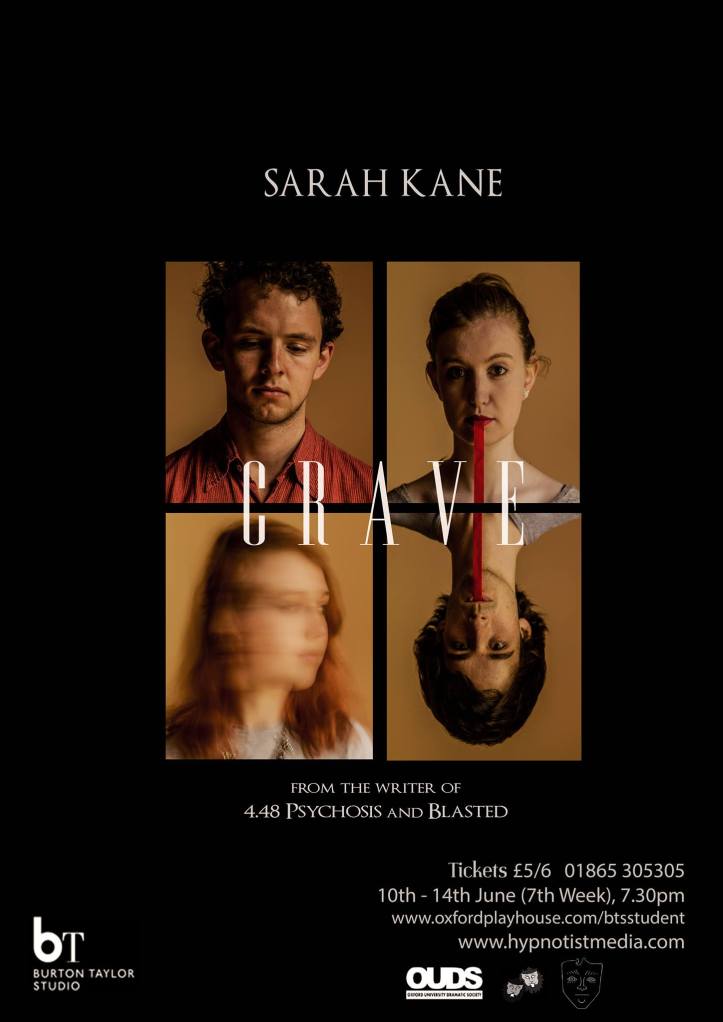Sarah Kane has gained some notoriety after the Daily Mail wrote off her first play, Blasted (1995), as a ‘disgusting feast of filth’. Her plays deal with, amongst others, topics such as rape, drug addiction, suicide, and cannibalism. True to form, Hypnotist Theatre’s production of her penultimate play, Crave, contains trigger warnings for rape and sexual assault, which provide the subject matter for the work. However, once the furore surrounding the presentation of “difficult” topics on stage has dissipated – these are hardly uncommon themes for many contemporary theatre writers – Crave seems to have little to recommend it beyond the Daily-Mail-driven hype. Although Hypnotist Theatre provided clever staging and compelling acting, the production rarely escaped the various clichés littered throughout the script, meaning that despite the production company’s commitment to ‘the uncomfortable’, I left the theatre distinctly unperturbed.
Written in a fragmentary style inspired by T. S. Eliot’s The Waste Land, Crave sets four voices identified only as A, B, C, and M in intertextual dialogue. The sex and gender of the characters are left to the director’s discretion, as are stage directions and sets. In this, Hypnotist Theatre managed superbly, choosing a barren setting with the four actors remaining in the same place for the entire act, illuminated only intermittently by spotlight. The staging complemented the disorienting nature of the text perfectly, the lack of physical interaction between the actors capturing the isolating impact that experiences such as rape, incest, drug addiction, and pedophilia can have. The main visual focus was provided by projections onto polystyrene cut to look like shards of broken glass (which, although in itself a worn trope, worked well in this context), reflecting ideas of fragmentation of identity that run throughout the play.
The sparsity of the staging meant that emphasis was thrown entirely onto the actors and the text. The actors dealt admirably with such exposure (Ed Barr-Simm’s monologue produced the highlight of the evening): the script, however, did not. In their promotion for the play, Hypnotist Theatre write that Crave elevates ‘the beauty of language above all’. For this to be effective, the language used has to be admirable, to make you look at the subject matter in a way that makes you think, that unsettles you in the way that Vladimir Nabokov’s Lolita has the ability to do when you find yourself identifying with Humbert Humbert. Unfortunately, when the text contains such gems as ‘Dull ache in my solar plexus’ and ‘If you died, it would be like my bones had been removed’, this is unlikely. Crave marks a change in Kane’s style from the bold, provocative, and brash to attempt something more poetic, but the result is a peculiar combination of the two. Neither abstract enough to provoke contemplation nor graphic enough to shock, it produces lines such as ‘Where has my personality gone … I am an emotional plagiarist’ which, for me, simply don’t convey the complexity of the issues they try to address.
While there were some lines that did give pause for thought, such as the moment where a child’s abusers are revealed to be her father and grandfather, the majority of the play lapsed into tired stereotypes that failed to spark my imagination. I realise that many will disagree with me and that Sarah Kane has a formidable following; indeed, for fans of Kane’s writing this production will be exceptional. However, sixteen years after Crave’s premiere so many writers have dealt with these subversive topics that their presentation in theatre is no longer a cause for controversy in itself, and Kane’s writing is open to comparison with later texts that have treated the same subjects with greater clarity and nuance. I commend Hypnotist Theatre’s ethos of presenting plays that are simultaneously ‘uncomfortable’, ‘dirty’, and ‘beautiful’, but for me, Crave didn’t quite manage to live up to this expectation.
Leah Broad
‘Crave’ runs at the Burton Taylor Studio until June 14th. Tickets are available here.
We are on Twitter @Oxford_Culture, and on Facebook
